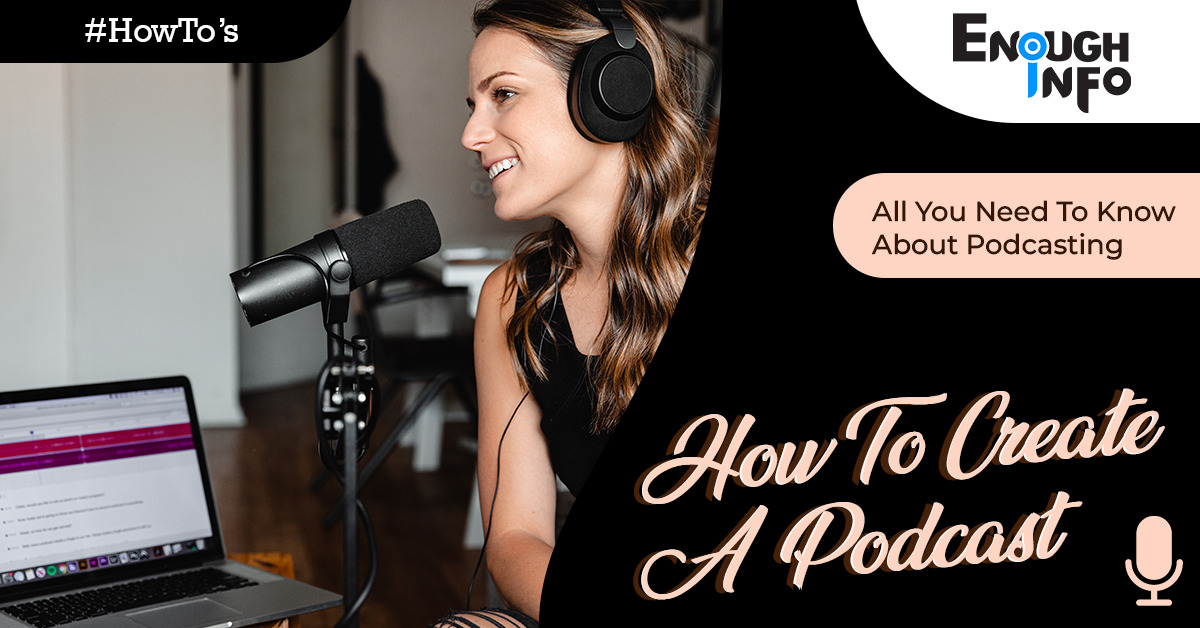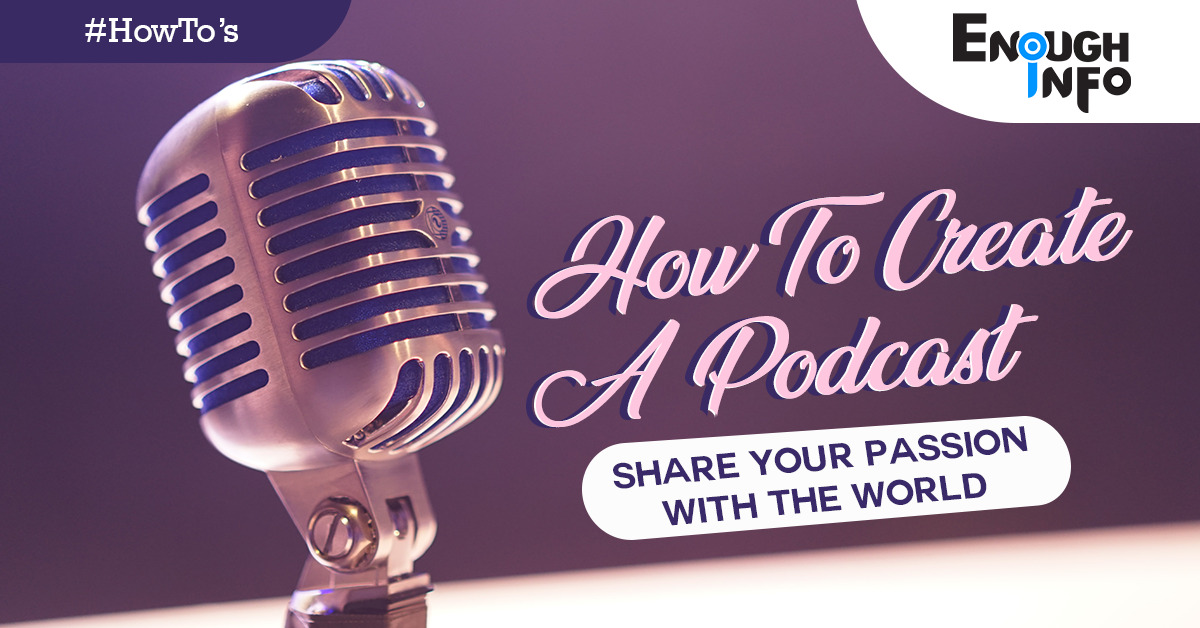How To Create A Podcast (All you need to Know)

How To Create A Podcast: Podcasting has gained immense popularity as a medium for sharing stories, discussing topics, and connecting with audiences around the world. EnoughInfo.com

Starting a podcast can be exciting, interesting, and profitable. Depending on your objectives, you may start a podcast as a pleasant hobby, a side job, or a company straight away. In this article, we’ll go through how to start a podcast, including what you should do, what you shouldn’t do, and how to make money.
Read Also: How To Become A TV Reporter
What Exactly Is a Podcast?
A podcast is an audio-only episodic series in which one or more hosts discuss a certain topic. Podcasts cover about any topic you can think of, from current affairs to real crime to beekeeping. How To Meditate For Beginners
Reasons to Launch a Podcast
There are numerous compelling reasons to start a podcast, the most common of which being:
- You want to grow your audience. The most popular podcasts have millions of listeners. A podcast is an inexpensive approach to gain a following.
- You want to establish yourself as an expert in your field or industry.
- You desire an additional source of earnings or income. Podcasts may be a strong tool to market your goods or service because they are a more intimate media. If you don’t want to offer a specific product or service, you might be able to monetize your podcast by playing sponsored adverts and earn money that way. How To Make Cold Brew Coffee (Step by step)
- You wish to expand your network. You can meet other individuals who are interested in what you talk about and can assist you advance your profession or business by podcasting.
- You want to have a good time. You don’t have to start a podcast with a specific business or revenue aim in mind. You can create a podcast just for personal entertainment. How To Paint A Watercolor Landscape
FAQs & Answers on How To Create A Podcast
1. Do I need expensive equipment to start a podcast?
While investing in quality equipment can enhance the overall sound quality of your podcast, you don’t necessarily need expensive gear to start. There are budget-friendly microphones available, and you can use free or low-cost audio editing software. Focus on finding a microphone that suits your needs and creating a quiet recording environment.
2. How long should my podcast episodes be?
The length of your podcast episodes will depend on your content and target audience. It’s generally recommended to aim for a duration between 20 and 60 minutes to keep listeners engaged. However, some podcasts may have shorter or longer episodes depending on the topic and format.
Read Also: How to Improve Your Spoken English (25 Sure Tips)
3. How often should I release new episodes?
Consistency is key when releasing new episodes. Choose a schedule that you can commit to and communicate it to your audience. Whether it’s weekly, bi-weekly, or monthly, the important thing is to maintain a regular release schedule to keep your listeners engaged and coming back for more. How To Remove Stains From Clothes
4. How can I grow my podcast audience?
Promote your podcast through various channels to expand your audience. Utilize social media platforms, create engaging content, collaborate with other podcasters or influencers in your niche, and encourage your listeners to share and review your podcast. Engaging with your audience and providing valuable content consistently will help you attract and retain listeners.
5. How long does it take to launch a podcast?
The time it takes to launch a podcast can vary depending on your preparation, recording schedule, editing process, and submission to directories. It can take anywhere from a few weeks to a couple of months to launch your podcast. Take the time to plan and create quality episodes before releasing your podcast to ensure a strong start.
6. Can I make money from my podcast?
Yes, you can monetize your podcast through various means, such as sponsorships, advertising, merchandise sales, crowdfunding, or even offering premium content or services. However, it’s important to note that building a substantial listener base and engaging with your audience consistently is crucial before monetizing your podcast.
7. Should I script my podcast episodes or improvise?
It depends on your preference and the style of your podcast. Some podcasters prefer scripting their episodes for a more structured and organized approach, while others prefer a more conversational and improvised style. You can find a balance by creating an outline or key points to guide your episode while allowing room for natural conversation and spontaneity.
8. Can I change my podcast’s name or format after launching?
Yes, you can make changes to your podcast’s name, format, or even rebrand it if necessary. However, it’s important to communicate these changes to your audience and update your podcast’s information on directories and platforms to avoid confusion.
Read Also: How To Start A Blog For Free (A Beginners Guide)
Common Podcast Misconceptions
Anyone, regardless of previous career or life experience, can start a podcast. Don’t allow the following common myths prevent you from establishing your own show:
You Must Have a Specific Skill Set. The only talent required is the capacity to talk about or debate anything. You don’t have to be an expert in anything, either, as long as you’re passionate about what you’re talking about. Expertise is desirable, but passion is required. How to tie a tie (A Step-by-Step Guide)
You’ll Need Expensive Tools. You can start a podcast with equipment you already have. You don’t need to invest any money on additional equipment or software. There are numerous free tools and resources available to help you get started.
Podcasting is a dying medium. Podcasts aren’t going away, nor are they losing popularity. The podcasting field is so valuable and dynamic that media corporations like Spotify and Apple are spending heavily in it in order to attract listeners (and income).
You’ll Need a Big Following. While it will help you acquire more listens at first, you do not need to be a celebrity or social media presence to launch a successful podcast. You can gain a following by creating good material that people find appealing.
Podcast episodes must be lengthy. A podcast does not have to be a certain duration. Your episodes can be as short or as long as you choose, depending on your audience. How To Make Homemade Pizza Dough
The Ultimate Guide: How to Create a Podcast

If you’ve been inspired to start your own podcast but don’t know where to begin, this comprehensive guide will take you through the step-by-step process of creating a successful podcast from concept to publication.
Read Also: How to Grow YouTube Subscriptions (8 Strategies in 2023)
Step 1: Define Your Podcast Concept:
Start by determining the focus and theme of your podcast. Consider your interests, expertise, and target audience. Choose a topic that you’re passionate about and that will engage your listeners. Refine your podcast concept by brainstorming ideas, outlining potential episodes, and identifying what unique value you can offer.
Step 2: Plan Your Episodes:
Create an episode structure that suits your podcast format. Determine the length of each episode, segment ideas, and the overall flow. Develop an episode outline or script to guide your content creation process. This will help you stay organized and maintain a consistent format throughout your podcast episodes. How To Cook Scrambled Eggs (Step By Step)
Step 3: Gather Your Equipment:
Invest in quality podcasting equipment. A basic setup typically includes a microphone, headphones, and a computer or laptop. Choose a microphone that suits your budget and recording environment. USB microphones are a popular choice for beginners. Additionally, use audio editing software such as Audacity or Adobe Audition to enhance the sound quality of your recordings.
Step 4: Record and Edit Your Episodes:
Find a quiet and acoustically pleasing location to record your podcast. Set up your microphone and begin recording your episodes based on your planned outline or script. Take multiple takes if needed to ensure the best quality. After recording, edit your episodes to remove any mistakes, background noise, or awkward pauses. Enhance the audio by adjusting volume levels and adding intro/outro music or sound effects. How To Sew A Button (Step-By-Step Guide)
Step 5: Choose a Podcast Hosting Platform:
Select a reliable podcast hosting platform to store and distribute your episodes. Popular options include platforms like Libsyn, Podbean, and Anchor. These platforms provide an RSS feed that you’ll submit to podcast directories, making your podcast accessible to listeners on various platforms like Apple Podcasts, Spotify, and Google Podcasts.
Read Also: How To Develop A Growth Mindset(The Ultimate Guide)
Step 6: Design Podcast Artwork:
Create eye-catching podcast artwork that represents your brand and captures the essence of your podcast. Use graphics software or seek the assistance of a professional designer. Your artwork should be visually appealing, include the podcast’s name, and convey the theme or mood of your show.
Step 7: Submit to Podcast Directories:
Submit your podcast to directories like Apple Podcasts, Spotify, and Google Podcasts. Follow the submission guidelines provided by each directory, which typically involve providing your podcast’s RSS feed, artwork, and a concise description of your show. Once approved, your podcast will be available for listeners to discover and subscribe to.
Step 8: Promote and Grow Your Podcast:
Promote your podcast to expand your listener base. Leverage social media platforms, create a website or landing page for your podcast, and collaborate with other podcasters or influencers in your niche. Engage with your audience through email newsletters, listener feedback, and social media interactions. Consistently release new episodes to keep your audience engaged and attract new listeners. How To Do A Basic Makeup Look (9 Good Steps)
How to Earn Money from a Podcast
There are numerous ways to monetize a podcast. Some approaches can be used successfully without a significant following, while others require demand and audience to work. As a podcaster, you should have more than one cash stream, regardless of which avenues you choose. Having only one source of income increases your financial risk.
1. Advertisements (or Episodes) Sponsored
If you’ve ever listened to a popular podcast, you’ve probably heard the podcaster read a sponsored advertising. Some firms will pay you to read a quick script about their product on your podcast.
Ads can be a very simple way to earn money, but they frequently necessitate a larger listenership and detailed demographic data. Companies will want to ensure that your podcast is a good fit for their ad by looking at how many listens or downloads you have, as well as demographic information about your audience. How To Do A Basic Makeup Look (9 Good Steps)
2. Affiliate links or codes
As an extension of sponsored adverts, brands for which you run advertisements may provide you with a special discount code for your listeners to use. You might then earn a small commission every time someone uses your discount code at the checkout when making a purchase.To promote increased use, including affiliate codes in your show notes and on social media.
Similarly, you can earn money by using affiliate links. You’ll earn a modest sales commission each time someone clicks on your link and makes a purchase, just like with codes. Amazon Associates, LTK, and Skillshare are some notable affiliate networks that you can join. How To Start A Blog For Free (A Beginner’s Guide)
3. Promoting Your Products or Services
You can increase sales of any existing services or products by discussing them on your podcast. Hearing you describe what you have to offer and how it will benefit your audience is an excellent method to educate them and move them closer to completing a purchase.
4. Coaching vs. Consulting
Your industry experience as a subject matter expert may be in demand in addition to the free material you provide on your podcast. You can utilize your podcast to book consulting or coaching clients, which are folks who want to learn from you in a more personalized setting.
Read Also: How to Create an Effective Content Marketing Plan (2023)
5. Accepting Donations or Gratuities
It takes time and work to run a podcast. You can simply ask your listeners to tip you or donate money to you to help cover the costs of producing each episode. Donations can be collected through sites such as Venmo, Patreon, or GoFundMe.
When soliciting tips or donations, try to be as explicit as possible about where the money will be spent, such as purchasing a new microphone for better sound, employing an intern to ramp up production, and so on.
6. Memberships or restricted content
Podcasts are normally free to listen to or download, but creating more episodes that are behind a paywall is one way to earn money. In this case, a listener must either pay a one-time fee or subscribe to a premium membership to gain access to the additional content.
Patreon and Buy Me a Coffee are two well-known sites for offering subscriber-only content.
7. Networks of Advertising
A podcast advertising network serves as your show’s agency. Advertising networks have relationships with brands and can help you find possibilities you might not have found otherwise. Some networks allow you to contact advertisers directly after joining, whilst others, more premium networks, can pitch to advertisers on your behalf.
AdvertiseCast, PodcastOne, and Megaphone are a few examples of podcast advertising networks. Keep in mind that in order to join an advertising network, you may need to meet specific standards, such as a minimum subscriber count.
8. Selling Products
You might sell branded goods featuring your podcast’s logo, iconography, or signature lines, depending on your branding and audience. Selling a calendar with your logo or phrase on it, for example, if you have a podcast about getting organized, might be a substantial method to create cash.
Read Also: 13 Tips To Grow Your TikTok Followers( Best Guide 2023)
Conclusion:
Creating a podcast is an exciting endeavor that allows you to share your passion, knowledge, or stories with the world. By following these steps—defining your concept, planning episodes, gathering equipment, recording and editing, choosing a hosting platform, designing artwork, submitting to directories, promoting your podcast, and releasing new episodes consistently—you’ll be on your way to creating a successful and engaging podcast. Embrace the journey, stay true to your vision, and keep improving your podcasting skills along the way. Remember, building a dedicated audience takes time and effort, so be patient and stay committed to delivering quality content that resonates with your listeners. Enjoy the process of creating and sharing your podcast, and let your unique voice shine through each episode. Happy podcasting!




